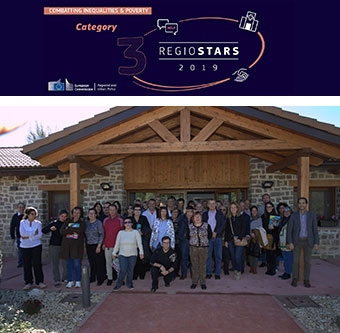The Jacob@ccess project is connecting four municipalities along the Way of Saint James – also known as the Camino de Santiago de Compostela – to make this cultural and historical heritage of the cross-border area of France and Spain accessible for people with physical and mental disabilities. At the same time, by upgrading the existing facilities along the way with accessible infrastructure and advanced equipment, the project is enhancing the heritage and culture of the region and reinforcing its economic fabric.
JACOB@CCESS: Breaking social barriers on the Way of Saint James
- 08 October 2019
The Pilgrim's Way to Santiago (Way of Saint James) is one of the busiest pilgrim routes in the world, an extensive network of roads that cover 80 000 km in 28 countries. It has received important international recognitions since its recovery in the 1980s. However, it was an impracticable path for people with disabilities or mobility difficulties. Jacob@ccess tries to make the road to Santiago accessible to these people.
As part of the project, on the road from Somport, France to Navarra, Spain, several interpretation facilities have been constructed to open the region to people with disabilities. These facilities serve as information points on hotels, restaurants, transportation services and lavatories.
In the French town of Ostabat, for example, a hostel, an interpretation centre and a restaurant designed to accommodate people with physical disabilities, were constructed. The Spanish towns of Jaca and Pamplona, both important partners in the project, built disabled-friendly interpretation centres. In the village of Martillué, part of the provincial city of Huesca, a hostel for disabled people has been constructed.
Improving physical and intangible access
The establishment of a cross-border network of these centres, hostels and restaurants tailored to the needs of the disabled, has allowed them to experience the Way of Saint James.
In addition to the infrastructural upgrades, through the project’s funding, the centres acquired modern interpretation equipment and installed the latest digital advances in museum presentation technologies. Every centre has specialised audio-visual units that people with physical and mental disabilities can use to learn about the culture, history, traditions and customs of the pilgrimage route.
Cross-border ‘Tourisme et handicap’
The cooperation of the territories involved in the project has resulted in a shared cross-border communication strategy that responds to a joint need for access to basic public services, in particular those linked to culture. All partners involved have signed long-term agreements to guarantee the maintenance and quality of the facilities and services. A collaboration of this kind promotes the exchange and development of good practices.
The project uses the French ‘Tourisme et Handicaps’ label to designate facilities adapted to the needs of people with disabilities. This adds to the project’s value, since it is the first time the label has been awarded outside France.
The Camino de Santiago is one of the most famous and busiest pilgrimage routes in the world. Although the parts in Spain and France are protected by UNESCO as world heritage and are the best known, the entire network of roads spans a total of 80 000 km in 28 countries, from north Africa to eastern Europe. The project is using the Camino de Santiago as a tool for social integration, enabling access for people with disabilities to an important part of the cultural and natural heritage of the cross-border area.
Total investment and EU funding
Total investment for the project “Jacob@ccess - Create a cross-border infrastructure to improve access for disabled people to Santiago de Compostela” is EUR 79 994 700, with the EU’s European Regional Development Fund contributing EUR 67 995 500 through the “Regional Research and Innovation” Operational Programme for the 2014-2020 programming period. The investment falls under the priority “Internal Market”.

